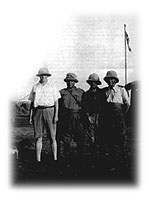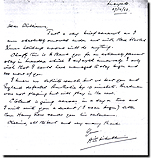
New Boy at the Office
He had also been somewhat daunted to learn that the decision to post him to Kiambu was made because of his reputation as a cricketer. He was a keen cricketer and he had captained his school side but he was not sure he was up to being the lynch pin for the officials against the settlers in a match which loomed shortly after his arrival. Fortunately, he did not disgrace himself and he was releived "to get a quick thirty odd" as his contribution to an overwhelming victory for the officials. Six months later he was posted to Meru where a chance meeting gave him the opportunity he sought to work in the "blue, blue, blue" and he found himself, in 1932, appointed District Officer Mandera.
The DO's house was a flat-roofed stone dwelling which was said to have been erected by a previous DO named Pease who let it be known that anyone wishing to see him would only be attended if he had brought a stone. There was a tree opposite the house which was riddled with bullet holes, said to have been made by Hugh Grant who would fire at the tree whenever he left the house. using two duelling pistols he kept on his belt. There lived my father, a young man of 23 years of age, memories of England still fresh in his mind and accompanied bya terrier-type called Pansy. A mile from Mandera ran the River Dawa which supplied the station with water. A string of camels loaded with barrels would make their daily trek to and from the river. My father began a vegetable garden on the banks of the Dawa. He grew tomatoes, french beans, beetroot and carrots. Unfortunately, baboons ate most of the produce. They even had a go at Pansy. When he arrived in Mandera a rebuilding programme was initiated. He was given six hundred shillings for such station buildings as the Dubas lines, a customs shed and a new roof for the office "using a few main poles for support, wire netting and makuti." Besides the DO, the station was inhabited by a Policeman called Horley, a Goan cashier called D'Costa and an interpreter, Ahmed Abdi. the Policeman and the DO took turns to stay in the Boma while the other went on Safari. There were also four or five tribal policemen. These were men of good character who came from local tribes. Discipline was strict with a high standard of conduct expected and "regular shooting training was de riguer at Mandera." Amongst his other duties, the DO was the Customs Officer, required to collect duty for goods brought into Kenya for the purpose of trade. He had to patrol the border against illicit activities from Italian Somaliland. One of these was leopard trapping. In 1933, leopard had been added to the schedules of animals for which a license was necessary and trapping became an offence under the Game Ordinance. However, the Italians had no such ordinance and there was a great demand by them for skins. Although the population in the Northern Frontier was very sparse, it consisted of small tribes and sub-tribes scattered over the desert, and peace had to be maintained between them. This was further complicated by the nomads constantly shifting back and forth across frontiers which made tax collecting and law enforcement haphazard. In the Mandera area alone my father's 'parishioners' as he called them, consisted of Gurreh, Regodia, Murille, Marehan, Leisan, Gurre Murre, Shabelle, Ashraf and Warabeh. It must have been rather confusing to a young man from the shires. Some of the tribes were agricultural people, but the majority were nomads. To complicate matters still further the Gurreh were not only sub-divided into three but they all had a long-standing feud with the Regodia. The Gurreh liked to embroider their stories and were prone to exaggeration. One night during the Jilal (dry season) two exhausted Gurreh came into my father's camp at Kilitcha and told him of five Gurreh dead during a raid. "They told me how they had personally buried two of the dead and they had seen the other three stretched out by the river." When my father hurried to the scene of slaughter, he found only one man had been killed. The government employed headmen to act as the link between each tribe and the administration. Each headman was well known to the DO, in whose gift the appointment was and a respectful relationship existed. The Headmen were helped by two Sub-Headmen, or "Sagale", recognisable by wearing turbans. As there was money in such appointments, DO's were cautioned to watch for turbanned pseudo-sagale after baksheesh. Although there were one or two lorries in the District, the main form of transport at that time was camels, hire of which cost 50 cents per day. If, however, a camel died while on government duty, the owner was reimbursed thirty shillings with no hire paid. Luxuries were few and it was a solitary existence for a young man, but it was here that Dad was introduced to "that heavenly nectar of whiskey in water cooled in a 'chagul' swinging from the side of a lorry or camel" after a hot and tiring day. District Headquarters was at Moyale, about one hundred and sixty miles to the west. There resided the District Commissioner, Major 'Mug' Mullins. Letters were exchanged between them, taken by lorry or camel. Unfortunately, my father's letters to his District Commissioner no longer exist, but correspondence from Mullins to Dad in Mandera give an interesting picture of the subjects which preoccupied a colonial servant in a distant African outpost. They are often long, detailed and domestic:
They also showed a cadet that if a man stayed in those desert wastes too long, he could veer between being crankily anti-humanity to touchingly eager for genial company in the space of a few days.
Early in 1933, Gerald Reece took over from Major Mullins as DC Moyale. From his letters he gives the impression of being a martinet whose irrascible tone at times must have been rather trying to a young DO stuck in Mandera often on his own for long periods. However, my mother tells me that the general attitude towards Reece - who rose far in the Colonial Service and was made a Knight of the Realm - was one of affectionate tolerance. Although perhaps not blessed with a cheery, calm nature, he was hard working, travelled his district constantly and his heart was in the right place. "The Moyale people are not very mindful or considerate." he complained from a safari near Malka Re. "I have had no mail for three months"
As well as the duties of tax collector and customs officer, the DO Mandera was also gazetted as Assistant Immigration Officer while yet another of his duties was to survey the border with Italian Somaliland and mend the beacons. He was not, of course, a surveyor but "that did not matter in the least." Another of his tasks was to construct a road alongside that boundary. "This was hardly an autobahn as it was only four yards wide." The idea behind the new road was to help control Italian-Somali marauders. The regular Italian army, called Centuri, had a strange system of employing two irregular, undisciplined forces called the "Google" and the "Banda" who raided the Kenya nomad clans wandering close by. The Italians took a great interest in the goings on at Mandera and sent innumerable spies to report. My father found the Italian Officials very obliging over small matters, but a general air of suspicion and distrust seemed to prevail with regard to British subjects, especially government servants, who visited Italian territory. They were invariably followed about, watched closely and, no doubt, reported upon. The River Dawa not only supplied Mandera with water but it demarcated part of the boundary with Ethiopia. When the meagre rains fell, the tribesmen would move away from the river to graze, returning during the Jilal (dry season). In the Ethiopian province of Oddo on the Kenya border, "the Abyssinians were wild and lawless and it was hard to tell who were soldiers and who were bandits. They used to levy a fine on all stock grazing on the Abyssinian side of the Dawa during the Jilal. This was encouraged by the Ethiopian officials, although I made an agreement with them that they should not levy a fine on stock which had accidentally strayed across the dry river." The senior Ethiopian official was a tall one-eyed man called Birara who could not speak Kiswahili but, having been educated in Cairo, spoke French. He would arrive accompanied by two or three officers "festooned with cartridge belts, armed with rifles, plus an escort of a dozen or so riff-raffish lads armed with rifles. A youth walked behind Birara holding a parasol over [his] head..." My father entertained Birara with his 'heavenly nectar' which "he reckoned was well worth it, for we certainly got most of our stolen stock back minus, of course, a few as commission." [Bertie Instone] The scarcity of water was a constant source of friction. "We have been having a good deal of trouble over the Boran" wrote Reece from Moyale in August 1933, "murders and quarelling with the Habash at the wells." During the Jilal, water could only be found in the river by digging and life was particularly perilous for the nomads who were constantly harrassed, not only by Ethiopian officials, but also by rustlers from the Ethiopian side of the border who would swoop upon the cattle which congregated in their numbers by the side of the Dawa. Consequently, the DO was obliged to spend much of the Jilal on the banks of the Dawa. "The result of this," said my father, "was that the DO could see many of his 'parishioners' without having to travel too far." Grazing principles had to be strictly observed in order that there should be sufficient for everyone; "first, the grazing away from the river should be finished before the river grazing was touched, and second that cattle should take precedence over camels in the use of river grazing." He pointed an accusing finger at the Regodia tribe who, he said, were the chief culprits in breaking the latter rule. Grazing rules, leopard licences, picking out twenty Somail with a potential for boxing and telling the truth, sharing his whisky with bandoliered Ethiopians and replying to cranky letters from his superior. Not be any means a light responsibility or a life of ease, but it certainly beat into a cocked hat most other forms of employment for a twenty-four year old from Bedford. |
Back to Table of Contents | Back to Articles | Chapter 5
Armed Forces | Art and Culture | Articles | Biographies | Colonies | Discussion | Glossary | Home | Library | Links | Map Room | Sources and Media | Science and Technology | Search | Student Zone | Timelines | TV & Film | Wargames



